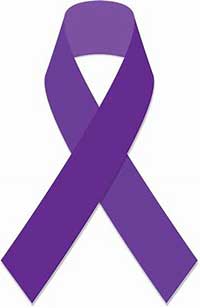
Purple ribbons are the symbol of elder abuse awareness. SCES and the Cambridge Council on Aging will distribute them in June, as part of Elder Abuse Awareness Month.
By Norah Al-Wetaid and Susan Pacheco
Older adults are disproportionately underserved when it comes to mental health issues, and this often contributes to elder abuse or neglect.
The good news is that resources are available to help. But both of these common issues typically fly under the radar, making awareness a key barrier.
The first thing to understand is that elder abuse and mental health issues know no boundaries. They are in every community, more often than people usually think. By most accounts, one in 10 older adults experience some form of elder abuse, which can mean physical abuse, financial or sexual exploitation, neglect or self-neglect.
The National Alliance on Mental Illness estimates one in five adults experiences some form of mental illness each year, with one in 25 cases being serious enough to substantially interfere with major life activities. The two most common manifestations of this problem that we see are depression and older adults trying to help family members with mental health issues.
Depression is not a normal part of aging, but it’s quite common. A recent study by the Tufts Health Plan Foundation found that roughly one out of three older adults was diagnosed with depression. Worse, it often goes undetected, because older adults are not routinely screened for mental health issues and the symptoms can present differently than in younger patients.
Depression can be both a contributing factor and effect of abuse; it often leads to isolation, which is a significant risk factor for abuse. Similarly, elder abuse survivors are more likely to experience depression or anxiety. Fortunately, the Centers for Disease Control now lists depression as the most successfully treated illness – but it starts with getting people the help they need.
Older adults often face a similar challenge when trying to help adult children or other relatives with mental health and substance misuse issues. There are often conflicting feelings about wanting to protect an adult child, and also wanting them to thrive and be independent. Unfortunately, there are not much in the way of social norms to help older adults here. It’s often hard to know the best course of action, but help is available.
June is Elder Abuse Awareness Month. For the fifth straight year, the Cambridge Council on Aging and Somerville-Cambridge Elder Services are marking the occasion by working together to raise awareness on these issues and help connect people with local resources. We are doing this with a purple ribbon campaign, by distributing that symbol of elder abuse awareness, along with information on the topic and resources to contact if there are concerns.
We are also hosting a special event: Enhancing Wellness: Mental Health and the Impact on your Community, on Thursday, June 20 from 1 to 3 p.m. at the Cambridge Citywide Senior Center (806 Massachusetts Avenue). Free and open to the general public, this event will feature a resource fair, expert-led discussion, and a performance by True Story Theatre. For more information about this event, call 617-349-6220 or email spacheco@cambridgema.gov.
We hope to see you there. But in any event, know that if you have concerns about elder abuse, neglect, self-neglect or financial exploitation you can call the Mass Elder Abuse Hotline at 1-800-922-2275. The hotline is a gateway to your local Adult Protective Services program, which is dedicated to working with older adults to mitigate risk factors.
Elder abuse and mental health issues are often linked. But by raising awareness and connecting people with resources, we can make a real impact on those issues in our community.
Susan Pacheco is Executive Director of the Cambridge Council on Aging, which works to promote the health and independence of local older adults by providing meaningful social and recreational options. Norah Al-Wetaid, LICSW is a Senior Elder Protective Services Worker at Somerville-Cambridge Elder Services, a non-profit dedicated to supporting independence and well-being of older adults and people with disabilities.

 https://www.portersquarebooks.com/
https://www.portersquarebooks.com/













Reader Comments